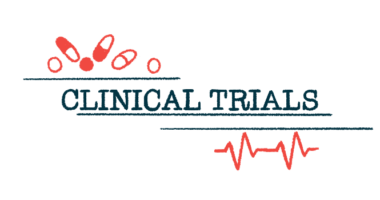Phase 2 trial of volixibat for PSC-related itching now fully enrolled
Top-line results expected between April and June of 2026

Enrollment is complete in the Phase 2b VISTAS clinical trial, which is testing the experimental oral treatment volixibat in people with itching due to primary sclerosing cholangitis (PSC).
Top-line results from VISTAS (NCT04663308), whose recruitment reached 182 participants, are expected between April and June of next year.
“Completing enrollment in VISTAS is a major milestone for the PSC community,” Joanne Quan, MD, chief medical officer of Mirum Pharmaceuticals, volixibat’s developer, said in a company press release. “We believe the data generated from VISTAS will be an important step toward bringing meaningful medicines to patients who currently have no approved therapies.”
Meanwhile, the similarly designed Phase 2b VANTAGE trial (NCT05050136) is testing volixibat in adults with itching due to primary biliary cholangitis (PBC) and is still recruiting globally. Mirum expects enrollment to wrap up next year, with top-line results available in 2027.
Volixibat works by suppressing key protein
PSC and PBC are autoimmune liver diseases characterized by chronic cholangitis, or inflammation in the tubes that carry the digestive fluid bile from the liver to the small intestine.
Over time, these tubes, called the bile ducts, become damaged, and bile flow may be stalled. Bile consequently accumulates in the liver and harms it, while bile acids, bile’s main component, also back up into the bloodstream and lead to symptoms such as itching, or pruritus.
Volixibat works by suppressing the ileal bile acid transporter protein, or IBAT, which recycles bile acids from the intestines back to the liver. By blocking IBAT’s actions, the experimental oral therapy is expected to promote the excretion of bile acids in the stool, helping to prevent their harmful accumulation and ease cholangitis symptoms.
The global VISTAS trial was designed to evaluate the safety and efficacy of two doses of volixibat (20 mg or 80 mg) against a placebo in people ages 12 and older with PSC-related pruritus. Participants receive oral capsules of their assigned treatment twice daily for up to 28 weeks, or nearly 6.5 months.
Study’s primary goal is to evaluate changes in patient-reported daily itch
The study’s primary goal is to evaluate changes in patient-reported daily itch, as assessed by the Adult Itch Reported Outcome (Adult ItchRO) questionnaire. Safety, changes in blood levels of bile acids and liver damage biomarkers, and patient-reported outcome measures will be evaluated as secondary goals.
Mirum reported last year that an independent data review committee determined that VISTAS had met prespecified safety and efficacy thresholds in an interim analysis conducted when 42 participants had completed their four-month assessments. The committee recommended the trial continue as planned, with the twice-daily 20 mg dose as the optimal dose for its confirmatory phase.
Completing enrollment marks a significant step forward in advancing a possible treatment for itch in PSC, bringing tremendous hope to our community.
The advocacy organization PSC Partners Seeking a Cure is enthusiastic about VISTA’s progress.
“PSC Partners is thrilled to see Mirum reach this important milestone with the VISTAS study,” said Ricky Safer, CEO of the organization. “Completing enrollment marks a significant step forward in advancing a possible treatment for itch in PSC, bringing tremendous hope to our community. Together, we are moving closer to new possibilities and a brighter future for those impacted by PSC.”
VANTAGE has a similar design to VISTAS, but involves adults with PBC-related itching. Interim results showed that volixibat was superior to a placebo for easing pruritus and was also associated with reductions in blood bile acid levels and fatigue. The most common side effect was mild or moderate diarrhea.
Like VISTAS, the study moved into a confirmatory phase with the twice-daily 20 mg dose.
The interim data also helped volixibat earn breakthrough therapy designation in the U.S. for treating PBC-related pruritus. This status offers incentives to expedite the therapy’s development and regulatory review.
After completing the six-month treatment period of VANTAGE or VISTAS, participants can opt to enter an open-label extension phase where all will be treated with volixibat for a longer period.








